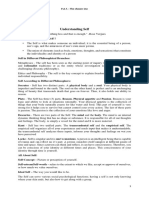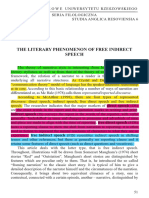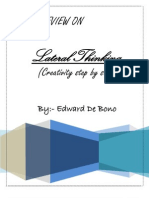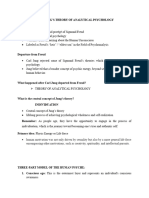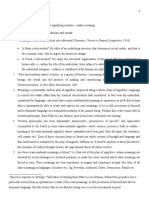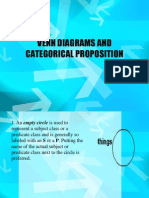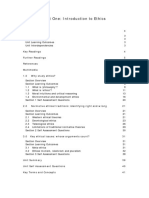Difference Between Idea and Thought
Difference Between Idea and Thought
Uploaded by
houssamouCopyright:
Available Formats
Difference Between Idea and Thought
Difference Between Idea and Thought
Uploaded by
houssamouCopyright
Available Formats
Share this document
Did you find this document useful?
Is this content inappropriate?
Copyright:
Available Formats
Difference Between Idea and Thought
Difference Between Idea and Thought
Uploaded by
houssamouCopyright:
Available Formats
Difference Between Idea and Thought
Jun 10th, 2011 | By Aron
Idea vs Thought Idea and Thought are two words that are often confused when it comes to their meanings and connotations. Idea refers to a plan or a process that occurs in the mind in relation to the completion of a work or duty. Thought on the other hand is a mental process that keeps on going in the mind unabated. This is the main difference between the two words idea and thought. Thought paves the way for an idea. This is the truth. Thoughts should combine to form an idea. In other words an idea is formed by the combination of thoughts about a particular problem. Hence you can say that the thought is a subset of idea. Observe the two sentences 1. The thought occurred in my mind. 2. An idea arose in my mind. In the first sentence the use of the word thought is to simply indicate a reason that occurred in the mind. On the other the use of the word idea in the second sentence is to indicate a plan that arose in the mind in relation to the solving of a problem or approaching a problem and the like. This is the difference between the usage of the two words idea and thought. A thought is a piece of reasoning produced by thinking. At times the word refers to a way of thinking that is characteristic to a particular class of people or society as in the expression the medieval European thought or the Western thought. An idea on the other hand refers to a conception or a plan formed by mental effort. In other words it can be said that an idea is nothing but a mental impression or notion or in simple words a concept. These are the differences between idea and thought.
Best Answer - Chosen by Voters
A thought is more general, it's anything that goes through your mind. An idea serves a purpose, it's a plan, opinion, suggestion, or concept. If I think, "my feet are cold," that is a thought, but not really an idea. If I think, "I should put on some socks because my feet are cold," that's an idea and a thought. Source(s): my opinion
hought Thought may be defined in general as mental activity, conscious or unconscious, based on the various modes of representation, including the most archaic. More narrowly, the meaning of thought may be confined to ideational activity, dependent on the faculty of judgment and on the faculty that brings into conjunction images of things and images of words. The discussion here will be restricted to the narrower conception of thought as ideational activity, but always bear in mind that the narrower meaning is deeply rooted in the more general one. http://www.answers.com/topic/thought idea It has become more common to think of ideas, or concepts, as dependent upon social and especially linguistic structures, rather than the self-standing creations of an individual mind, but the tension between the objective and the subjective aspect of the matter lingers on, for instance in debates about the possibility of objective knowledge, of indeterminacy in translation, and of identity between the thoughts people entertain at one time and those that they entertain at another. http://www.answers.com/topic/idea Thought is psychological, and idea is philosophical.
What is the difference between an idea and thought?
Like (XT likes this.) Report Share:
Other
Sort answers by:
Greatness / Likes
ANSWERS. 1 helpful answer below.
by XT on October 26th, 2009
In the most narrow sense, an idea is just whatever is before the mind when one thinks. Very often, ideas are construed as representational images; i.e. images of some object. In other contexts, ideas are taken to be concepts, although abstract concepts do not necessarily appear as images. Many philosophers consider ideas to be a fundamental ontological category of being. The capacity to create and understand the meaning of ideas is considered to be an essential and defining feature of human beings. In a popular sense, an idea arises in a reflex, spontaneous manner, even without thinking or serious reflection, for example, when we talk about the idea of a person or a place. Thought and thinking are mental forms and processes, respectively ("thought" is both). Thinking allows beings to model the world and to deal with it according to their objectives, plans, ends and desires. Words referring to similar concepts and processes include cognition, sentience, consciousness, idea, and imagination.
Read more: What is the difference between an idea and thought? | Answerbag http://www.answerbag.com/q_view/1773687#ixzz2FDyBVszS
1.
John Schinker on February 27, 2010 at 12:22 pm said:
Thought does always precede the idea, even if it's not conscious, sustained, targeted thought. Google Wave is meant to solve a problem. The fact that many people (most people?) don't agree that the problem IS a problem is reflected in the reaction to the tool. But the idea for Wave came out of a problem that the Google designers identified. There's still room for inspiration that Eureka moment when new ideas are born. But even if we're not spending hours/days/years trying to find a solution to a problem, those moments of inspiration are invariable preceded by some recognition of a problem that needs to be solved.The minority faces the uphill struggle of inertia. People are interested in Wave or Buzz because they're already using Google products. Not only is there already a track record of successful Google products, but it's easy perhaps too easy to add another item to the Google toolbox. That's not the same as some new startup that may have found the perfect solution to a fundamental problem, but can't get people to look at it.Looking forward to the last three points in the gist.
Reply
Zac Chaseon February 27, 2010 at 12:37 pm said:
I think this line of thinking presupposes an idea must have a purpose. Waveis being rejected because we haven't followed the same thinking as thegoogle designers. It's an idea that came to us without our thinking. It'sasking us to play. It's a kind of, Here, we made this. What can you do withit.Also, I know I'm getting semantic (and I hate it when I read semanticarguments), but I'd argue the unconscious, unsustained, untargeted stuff inour brain isn't what we talk about when we talk about thinking. The closestI can come to it is pondering or maybe daydreaming.For the purposes of this line of thinking, I'm talking about thinking in thesense of, I want you all to think about X. Thanks for drawing that out.I get what you're saying about inerti a. Aren't there many cases of minoritythoughts gaining traction and momentum? I agree with the idea of Googlecounting on the success of its other products leading to the use of its newproducts. Brand loyalty is strong. Still, we're used to choices. If we don'tsee the fit in Wave or Buzz, we'll walk away from them. (And I realize theinherent consumer politics invoked in bringing up Wave, but it was whatstarted me playing with this.) I wonder, though, if the choices make usdull. If an idea asks us to think differently, have we started turning awaybecause we can easily find ideas that make it easier to stay comfortable? Isthat thinking or tradition?In the case of the example of a startup, I think this might be an example ofthinking up a perfect solution to a problem or set of problems we haven'tthought of. Is choice killing our creativity?
Reply
2.
aleaness on February 27, 2010 at 12:33 pm said:
I think that I often abandon play or thoughts only to revist when I have developed my thoughts further. I need to mull things over, digest, and then re-engage. I don't always get the endgame at first, or need to create my own edgame. Do we allow that tme for re-engaging with our students or are we just plowing through? Maybe this is what you were saying, I have to think about it more, revisit your thoughts.
Reply
3.
Ms. V. on September 23, 2012 at 5:19 pm said:
Google Wave was the developers idea following on their thought. The user had to think in response to these developers idea. I would argue that thinking came first to the users, too because the idea of Wave isnt THEIR idea, though it gave them something to puzzle over and respond to. Perhaps the users idea, which followed, was that they didnt see a purpose for it yet, or maybe in some cases it was an idea about how it might fit into their own lives, or a nove l use for it that went beyond what the developers thought about. I agree that thought may not have to precede ideas or at least, its hard/impossible to prove that thought comes before idea in EVERY case, so Ill go with it but I dont think your example demonstrates this very well.
Reply
o
to use it.
autodizacticon September 23, 2012 at 6:52 pm said:
Whats interesting, is you point to two separate actions (to my mind). The first is the thought->idea movement with the Wave developers. The second (and the one I was working to highlight) was the idea->thought movement on the part of users. They were presented with the idea of Wave and then had to think of how Im resistant to point to where ownership of an idea is situated. The product Wave was that of the developers. Im not sure the successive iterations of Waves use by customers werent at least joint ownership of the idea. Id also say I envision users being presented with the idea of wave, thinking of how to use it, and then creating the idea/use theyd thought of. In this case, its almost cyclical. As I said in the introduction, the ideas of the post were protean. Thanks for asking me to re-examine my thinking and flesh it out a bit more.
Reply
You might also like
- Putting People FirstDocument8 pagesPutting People FirstAndrada Feiereisz100% (2)
- Fodor - Reply To Steven PinkerDocument8 pagesFodor - Reply To Steven PinkerflipindoreNo ratings yet
- Understanding Self Society and CultureDocument7 pagesUnderstanding Self Society and CulturePaul Tobias100% (1)
- Descartes' Rationalism: Rational IntuitionDocument4 pagesDescartes' Rationalism: Rational IntuitionTrung TungNo ratings yet
- For Aristotle Education Is What Equips Us For A Better Life Aeon EssaysDocument10 pagesFor Aristotle Education Is What Equips Us For A Better Life Aeon Essaysapi-516557147No ratings yet
- The Literary Phenomenon of Free Indirect Speech: Alina LESKIVDocument8 pagesThe Literary Phenomenon of Free Indirect Speech: Alina LESKIVcatcthetime26No ratings yet
- Cap. 9 HarveyDocument38 pagesCap. 9 HarveyJosiane TrevisanNo ratings yet
- Connotative and Denotative Meaning HandoutDocument1 pageConnotative and Denotative Meaning HandoutMuhammad ArliandiNo ratings yet
- Wittgenstein Picture TheoryDocument4 pagesWittgenstein Picture TheoryAlladi Bhadra Rao DevangaNo ratings yet
- FuntionalismDocument10 pagesFuntionalismAnonymous Mz4KJQ02ZtNo ratings yet
- QUINE. TWO DOGMAS OF EMPIRICISMdocxDocument16 pagesQUINE. TWO DOGMAS OF EMPIRICISMdocxBankong EmmanuelNo ratings yet
- Contextual Factors: Cognitive Operations, Embodiment, and ContextDocument24 pagesContextual Factors: Cognitive Operations, Embodiment, and ContextspimapaeNo ratings yet
- Western Concept of ManDocument7 pagesWestern Concept of ManRenz LimNo ratings yet
- The Schools of Indian Philosophy (Dipu Paul)Document18 pagesThe Schools of Indian Philosophy (Dipu Paul)SINDHU. VNo ratings yet
- Differences Between Oxymoron and ParadoxDocument9 pagesDifferences Between Oxymoron and ParadoxClumsyHumaneNo ratings yet
- The Methods of PhilosophyDocument16 pagesThe Methods of PhilosophyCristina GayyedNo ratings yet
- 1.02 Methods of Organizing InformationDocument2 pages1.02 Methods of Organizing Informationria wuNo ratings yet
- 03 Edamura TheDeisticGod 124 PDFDocument14 pages03 Edamura TheDeisticGod 124 PDFPurandarNo ratings yet
- Debating Humanity. Towards A Philosophical Sociology: Daniel CherniloDocument20 pagesDebating Humanity. Towards A Philosophical Sociology: Daniel CherniloEka Wahyudi NggoheleNo ratings yet
- About The Author: Vedic Science and Is Currently Finishing A Paper Entitled Shirley."Document47 pagesAbout The Author: Vedic Science and Is Currently Finishing A Paper Entitled Shirley."AMTRNo ratings yet
- D. H. Lawrence's Vision of The Novel andDocument18 pagesD. H. Lawrence's Vision of The Novel andknesux100% (1)
- AlakkaDocument3 pagesAlakkaGaurav SinghNo ratings yet
- Argument Against The Trinity by Danny and FrictionDocument12 pagesArgument Against The Trinity by Danny and FrictionSixDeuxNo ratings yet
- Hegel's Absolute Idealism and His Dialectical Process of UnderstandingDocument2 pagesHegel's Absolute Idealism and His Dialectical Process of UnderstandingZaky AyatillahNo ratings yet
- The Subjectivity of ObjectivityDocument12 pagesThe Subjectivity of ObjectivityPaulo JovellanoNo ratings yet
- 04 The Transcendence of The EgoDocument2 pages04 The Transcendence of The EgoMatt IskraNo ratings yet
- Updated August 02, 2018: Meaning or Semantic MeaningDocument2 pagesUpdated August 02, 2018: Meaning or Semantic MeaningDinda Hasibuan 005No ratings yet
- Introduction To Philosophy - NotesDocument4 pagesIntroduction To Philosophy - NotesSAMANTHA ANN GUINTONo ratings yet
- Book Review-Lateral ThinkingDocument7 pagesBook Review-Lateral Thinkingumeshyadav1989No ratings yet
- Eternity: THE T IdeasDocument8 pagesEternity: THE T Ideasjprgg24No ratings yet
- Ecolinguistic Patterns in SpeechDocument15 pagesEcolinguistic Patterns in SpeechAmmar GhNo ratings yet
- Da Unit 5 GradoDocument64 pagesDa Unit 5 GradoMaryam مريمNo ratings yet
- The Theory of Thought 1000108153Document336 pagesThe Theory of Thought 1000108153Abdul Sami Abdul Latif100% (1)
- Max MullerDocument4 pagesMax MullerAnshu ThakurNo ratings yet
- 2 - Intercultural and Gendered CommunicationDocument29 pages2 - Intercultural and Gendered CommunicationGeorgiana SsaNo ratings yet
- Existential Phenomenology and Embodied Cognition On Mental IllnessDocument10 pagesExistential Phenomenology and Embodied Cognition On Mental IllnessA.S.WNo ratings yet
- Gandhi's Philosophy of Non-ViolenceDocument4 pagesGandhi's Philosophy of Non-ViolenceKostas Sas100% (1)
- Unsur Unsur Puisi LengkapDocument49 pagesUnsur Unsur Puisi LengkapAndhini De AngeloNo ratings yet
- Applied LinguisticDocument23 pagesApplied LinguisticFatulous100% (1)
- Blocker World PhilosophyDocument262 pagesBlocker World Philosophypjanssen2306No ratings yet
- Transitional WordsDocument13 pagesTransitional WordsReza HassanNo ratings yet
- Modernism Vs PostmodernismDocument3 pagesModernism Vs PostmodernismChandni JeswaniNo ratings yet
- Emerging Trends in English Language and LiteratureDocument5 pagesEmerging Trends in English Language and LiteratureRAGALATHA REDDYNo ratings yet
- Blaise PascalDocument6 pagesBlaise PascalDavid JiménezNo ratings yet
- Cannon Bard Theory of Emotion - PsychologyDocument1 pageCannon Bard Theory of Emotion - PsychologyshaukhgNo ratings yet
- Spinoza - The Three Kinds of KnowledgeDocument2 pagesSpinoza - The Three Kinds of KnowledgeAhmadNo ratings yet
- Chapter 4Document21 pagesChapter 4gobitristenNo ratings yet
- Cognitive ScienceDocument10 pagesCognitive ScienceDoris TănaseNo ratings yet
- Notes On InterpellationDocument6 pagesNotes On InterpellationOle BabaleNo ratings yet
- Ferdinand de Saussure Was A Swiss Linguist Who Laid The Foundation On The Ideas of Structure in The Study of LanguageDocument6 pagesFerdinand de Saussure Was A Swiss Linguist Who Laid The Foundation On The Ideas of Structure in The Study of LanguageWahyu Unggul WidodoNo ratings yet
- Carl JungDocument4 pagesCarl Jungestabillogeumi100% (1)
- Lesson 9Document6 pagesLesson 9Kim SolimanNo ratings yet
- 4.hegels Conception of Self-ConsciousnessDocument26 pages4.hegels Conception of Self-ConsciousnessMerima DzaferadzovicNo ratings yet
- Urban Geography and Urban EcologyDocument6 pagesUrban Geography and Urban EcologyKim Lorenzo CalatravaNo ratings yet
- Akiwowo - Sociology in Africa TodayDocument72 pagesAkiwowo - Sociology in Africa TodayViviane Pereira100% (2)
- 6 - Set Membership and Set ContainmentDocument30 pages6 - Set Membership and Set ContainmentBono, Pedro Jr. S.No ratings yet
- Post-Structuralism: Poststructuralism: A Very Short Introduction, 2002Document3 pagesPost-Structuralism: Poststructuralism: A Very Short Introduction, 2002rupal aroraNo ratings yet
- Venn Diagrams and Categorical PropositionDocument18 pagesVenn Diagrams and Categorical PropositionMary Jean Asuncion BrocoyNo ratings yet
- Defending A Dogma: Between Grice, Strawson and Quine: Elvis ImafidonDocument10 pagesDefending A Dogma: Between Grice, Strawson and Quine: Elvis ImafidonYang Wen-LiNo ratings yet
- Developing Resilience As An EducatorDocument2 pagesDeveloping Resilience As An EducatorGodman KipngenoNo ratings yet
- Harmonious Monism: A Philosophical Logic of Explanation for Ontological Issues in Supernaturalism in African Thought.From EverandHarmonious Monism: A Philosophical Logic of Explanation for Ontological Issues in Supernaturalism in African Thought.Rating: 5 out of 5 stars5/5 (1)
- Social Representations TheoryDocument14 pagesSocial Representations Theoryhoussamou100% (1)
- 101 Ielts Speaking Part Two Topic Cards That Tie in With Ielts Speaking Part OneDocument25 pages101 Ielts Speaking Part Two Topic Cards That Tie in With Ielts Speaking Part OnehoussamouNo ratings yet
- Reading Writing ConnectionsDocument448 pagesReading Writing Connectionshoussamou100% (2)
- 4ms 1st Term Test by Mr. AnouarDocument1 page4ms 1st Term Test by Mr. Anouarhoussamou100% (1)
- Linguistics Test OneDocument6 pagesLinguistics Test OnehoussamouNo ratings yet
- Straightforward Quick Placement & Diagnostic Test - Answer KeyDocument1 pageStraightforward Quick Placement & Diagnostic Test - Answer KeyhoussamouNo ratings yet
- Exercises On Simple PresentDocument2 pagesExercises On Simple PresenthoussamouNo ratings yet
- Grammar ReviewDocument2 pagesGrammar ReviewhoussamouNo ratings yet
- Tribes, Great Britain, and SpainDocument2 pagesTribes, Great Britain, and SpainhoussamouNo ratings yet
- Have Seen Have Met Have Been Have Known: Verb Tenses (2) Present PerfectDocument6 pagesHave Seen Have Met Have Been Have Known: Verb Tenses (2) Present PerfecthoussamouNo ratings yet
- United States of America or United StatesDocument2 pagesUnited States of America or United StateshoussamouNo ratings yet
- The New Nation: Father of Our Country. Washington Took The Oath of Office On April 30, 1789. This Hero of TheDocument4 pagesThe New Nation: Father of Our Country. Washington Took The Oath of Office On April 30, 1789. This Hero of ThehoussamouNo ratings yet
- BBMS3011 Autism and SchizophreniaDocument32 pagesBBMS3011 Autism and Schizophreniakeven319hk4304No ratings yet
- Sennett, Richard (2012) - Together: July 2014Document5 pagesSennett, Richard (2012) - Together: July 2014Roxana TudorNo ratings yet
- Yoga PosesDocument25 pagesYoga PosesHoratiu Petrescu100% (1)
- Framework2010 PDFDocument1 pageFramework2010 PDFpowell.gordonNo ratings yet
- APPROACHES TO STRATEGY (CONTINUED) - Strategic ManagementDocument5 pagesAPPROACHES TO STRATEGY (CONTINUED) - Strategic Managementrohan_jangid8100% (4)
- Actualise YourselfDocument1 pageActualise YourselfBharath GopalanNo ratings yet
- Making Sense of Graphs: Critical Factors Influencing Comprehension and Instructional ImplicationsDocument35 pagesMaking Sense of Graphs: Critical Factors Influencing Comprehension and Instructional ImplicationsGlesiane Coelho de AlaorNo ratings yet
- 2-Hour Class Lesson Plan Template 2Document2 pages2-Hour Class Lesson Plan Template 2Eman ElzeftawyNo ratings yet
- ACR-ARTS-MONTH - PINAG-ANAKAN-IS. HSdocxDocument7 pagesACR-ARTS-MONTH - PINAG-ANAKAN-IS. HSdocxMalynche VillariasNo ratings yet
- 2018 STAAR English II Key Paper Revised Tagged PDFDocument1 page2018 STAAR English II Key Paper Revised Tagged PDFjaylen gardnerNo ratings yet
- Study Text: Business CommunicationDocument270 pagesStudy Text: Business CommunicationTeacher HaqqiNo ratings yet
- p563 Unit 01 PDFDocument41 pagesp563 Unit 01 PDFMichelle Oquindo TucongNo ratings yet
- Iop3703 01 Mark100100Document10 pagesIop3703 01 Mark100100xoliswa mandisa dlaminiNo ratings yet
- How To Write Recommendations in ResearchDocument5 pagesHow To Write Recommendations in ResearchEden MonforteNo ratings yet
- Risk Assesment Bank ParkDocument3 pagesRisk Assesment Bank ParkFiona EllisNo ratings yet
- Business of Coaching Book 1Document187 pagesBusiness of Coaching Book 1Norman Gresham100% (18)
- OpeningDirections HandoutDocument5 pagesOpeningDirections HandoutIrena Bragg100% (3)
- MR & RM Case ReportDocument8 pagesMR & RM Case Reportsandeep b tNo ratings yet
- Cognitive-Behavioral Social Skills Training For Schizophrenia A Practical Treatment Guide (Etc.) (Z-Library)Document338 pagesCognitive-Behavioral Social Skills Training For Schizophrenia A Practical Treatment Guide (Etc.) (Z-Library)mk0599450No ratings yet
- MMPIDocument53 pagesMMPIKF KhanNo ratings yet
- Linear and Non Linear TextsDocument15 pagesLinear and Non Linear TextsTeacher JhenNo ratings yet
- English10 Q2 Mod5Document14 pagesEnglish10 Q2 Mod5Lindsay NatividadNo ratings yet
- Kolbs FinalDocument12 pagesKolbs Finaladitya saiNo ratings yet
- SpellingDocument1 pageSpellingMary-Ann SanchezNo ratings yet
- Chapter 3 Notes PDFDocument4 pagesChapter 3 Notes PDFAshi KaurNo ratings yet
- Number One Teacher: DreamDocument5 pagesNumber One Teacher: DreamOsama Mirkhan NabiNo ratings yet
- Canadian Triage PDFDocument3 pagesCanadian Triage PDFJany UllauriNo ratings yet
- S.No Answer Options: 1 Choose The Correct Answer: If One Bird Has Two Claws, How Many Claws Do 4 Birds Have?Document3 pagesS.No Answer Options: 1 Choose The Correct Answer: If One Bird Has Two Claws, How Many Claws Do 4 Birds Have?Ashish DasNo ratings yet


